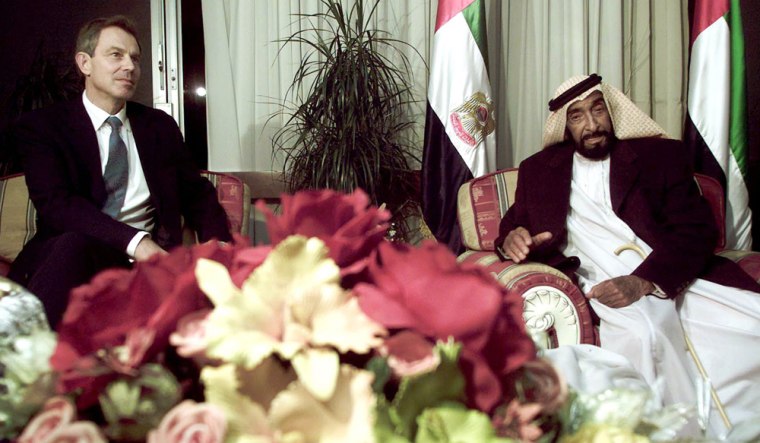The president of the United Arab Emirates, who helped forge a federation from seven Persian Gulf states and ruled it since its creation, has died. He was 86.
Sheik Zayed bin Sultan Al Nahyan, the absolute ruler of the UAE for more than 30 years, had been ailing for several years and did not attend Arab summits. He had a kidney transplant in August 2000.
His eldest son, Sheik Khalifa bin Zayed Al Nahyan, has been heir apparent since 1969, when his father named him crown prince of Abu Dhabi, the capital and richest of the seven emirates.
Abu Dhabi TV interrupted regular broadcasting with news of Sheik Zayed’s death, but no cause of death was reported. The announcement was followed by an Islamic cleric appearing on TV reading verses from the Quran.
Official announcement
The official Emirates news agency, WAM, also announced news of his death, saying: “The presidential court announces to the people of the Emirates, the Arab and Muslim worlds, and the entire world, that the leader of the nation and the builder of its civilization, His Highness Sheik Zayed bin Sultan Al Nahyan, died on the evening of Tuesday, Nov. 2, the 19th of Ramadan. May God have mercy on him.”
Under Sheik Zayed's rule, the Emirates has become a leading regional financial and banking center with close ties to the United States and other Western nations. But following the Sept. 11, 2001 attacks on the United States, the Emirates were among several Middle Eastern countries that came under pressure from Washington to reform its financial and banking sectors, which had been used to funnel funds to international terrorist groups, like al-Qaida.
Sheik Zayed died a day after announcing the Emirates' first Cabinet reshuffle since 1977. The reshuffle, which WAM said was suggested by UAE prime minister and vice president, Sheik Maktoum bin Rashid Al Maktoum, saw another of Sheik Zayed's sons, Sheik Saif bin Zayed Al Nahyan, made interior minister. He replaced longtime interior minister Lt. Gen. Mohammed Saeed Al Badi.
The reshuffle also saw a new oil minister appointed plus the naming of the Emirates' first-ever woman Cabinet minister, with Sheika Lubna Al Qasimi being named economy minister.
With Sheik Zayed's ailing health keeping him out of the public spotlight during the past few years, Sheik Maktoum has become the public face of the Emirates, building close ties with the West and
Arab neighbors and presiding over the wealthy country's continuing growth, spurred by growth in the financial, technological and construction sectors.
Since 1966, Sheik Zayed has ruled Abu Dhabi, which became the capital of the United Arab Emirates when the seven-emirate federation was formed in 1971 after taking independence from Britain in a campaign that Sheik Zayed led.
While the rulers of the seven emirates must choose the next president, they are expected to settle on Sheik Khalifa, though he lacks his father's charisma and reputation. Sheik Khalifa is also deputy commander of the armed forces and, as chairman of Abu Dhabi's executive council, handles most of the emirate's day-to-day affairs.
It was not immediately clear when a decision would be made on Sheik Zayed's successor.
